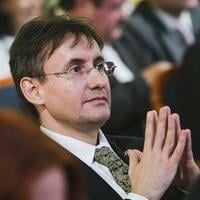I think that the anti-Darwinian intelligent design (ID) movement is, at least partially, a (flawed) reaction to a mirror example of a confusion of science and belief, namely ‘scientific' ( scientistic) atheistic evolutionism. Too many scientists have tried to persuade the public that evolution is incompatible with religious belief. (Ironically, creationists agree about that.) They claimed that Darwinian theory has destroyed any reason to believe in God by showing that man is a result of a blind accident. Yet, in my opinion both ID advocates and scientistic atheists fail to see that the controversy of theistic vs. atheistic interpretation of evolution is a metaphysical problem, a problem that goes beyond (meta) physics. It lies at the intersection of science and philosophy/theology, not in the realm of empirical science itself.
If an atheistic evolutionist like Richard Dawkins says that nothing exists except selfsufficient, uncreated Universe, he ceases to talk as an empirical scientist. He begins to talk as a philosopher, though, unfortunately, not being aware of it. (P)a(n)theism is a metaphysical point of view. It is a fundamental philosophical error to present it as a scientific claim. In addition, exciting philosophical discussion about the deepest character of our reality is now more alive than ever and was in no case settled in favour of atheism. There have been both theistic and atheistic evolutionists taking part in this lively debate. For example, anthropic reasoning leads theists to see biological evolution as a part of cosmic evolution. They believe that fine-tuning of physical constants, allowing us to exist, is a hint that our universe was made with life and man in mind. Even truly random events might contribute to guiding the attractor of cosmic evolution to a "life solution". Indeed, "random" events (if they exist) do not necessarily make evolution "unguided", as illustrated by randomized optimization algorithms (e.g. genetic algorithms), that are able to find a specific solution in a system's state space.
There is much evidence that neo-Darwinism describes at least part of the truth. Replication, variation (mutations) and selection are three important (necessary) mechanisms that are at work in evolution. Nevertheless, I agree with Stephen Barr that the neo-Darwinian theory is probably not sufficient to account for the biological evolution. The scientific discussion continues. Let me cite from a recent review of a new book on evolution (Andreas Wagner: Robustness and Evolvability in Living Systems, Princeton University Press) that was published in Science (Greg Gibson, The Origin of Stability, Vol 310, p. 237):
"Several years ago, Stuart Kauffman prefaced The Origins of Order with the observation that ‘no body of thought incorporates self-organization into the weave of evolutionary theory'. Robustness and Evolvability in Living Systems adds an extra dimension to this endeavor. Wagner contributes significantly to the emerging view that natural selection is just one, and maybe not even the most fundamental, source of biological order. His two-page epilogue throws out seven open questions for systems biologists and neo-Darwinians to consider; hopefully they will do so." In my opinion, teaching students basic philosophy of science and presenting the atheism/theism dialogue in an intelligent way (see e.g. introductory textbook of J. Polkinghorne: Science and Theology, 1998) will help to keep ideologies of ID and atheistic scientism out of the classroom.






